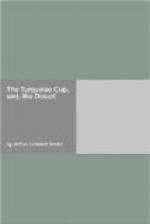The curtains parted, and the servant announced, “The Earl of Vauxhall.”
The cardinal rose from his chair.
A young man stepped upon the balcony. He was tall and lithe and blond, and six-and-twenty.
“Your grace,” he said, “I have come because I am in deep trouble.”
“In that event,” said the cardinal, “you do me much honor. My vocation is to seek out those who are in trouble. When they seek me it argues that I am not unknown. You are an Englishman. You may speak your own language. It is not the most flexible, but it is an excellent vehicle for the truth.”
“Thank you,” said the young man; “that gives me a better chance, since my Italian is of the gondolier type. I speak it mostly with my arms,” and he began to gesticulate.
“I understand,” said the cardinal, smiling, “and I fear that my English is open to some criticism. I picked it up in the University of Oxford. My friends in the Vatican tell me that it is a patois.”
“I dare say,” said the young man. “I was at Cambridge.”
“Ah,” said the cardinal, “how unfortunate. Still, we may be able to understand one another. Will you have some tea? It is a habit I contracted in England, and I find it to be a good one. I sit here at five o’clock, drink my cup of tea, feed the pigeons that light upon the railing, and have a half-hour in which to remember how great is England, and”—with a bow—“how much the rest of the world owes to her.”
“A decent sort of chap, for an Italian,” thought the earl. The cardinal busied himself with the tea-pot.
“Your grace,” said the earl, finally, “I came here in trouble.”
“It cannot be of long standing,” said the cardinal. “You do not look like one who has passed through the fire.”
“No,” said the earl, “but I scarcely know what to say to you. I am embarrassed.”
“My son,” said the cardinal, “when an Englishman is embarrassed he is truly penitent. You may begin as abruptly as you choose. Are you a Catholic?”
“No,” replied the earl, “I am of the Church of England.”
The cardinal shrugged his shoulders the least bit. “I never cease to admire your countrymen,” he said, “On Sundays they say, ’I believe in the Holy Catholic Church,’ and, on work-days, they say, ’I believe in the Holy Anglican Church.’ You are admirably trained. You adapt yourselves to circumstances.”
“Yes,” said the earl, a trifle nettled, “I believe we do, but at present I find myself as maladroit as though I had been born on the Continent—in Italy, for example.”
“Good,” laughed the cardinal; “I am getting to be a garrulous old man. I love to air my English speech, and, in my effort to speak it freely, I sometimes speak it beyond license. Can you forgive me, my lord, and will you tell me how I can serve you?”
“I came,” said the Earl of Vauxhall, “to ask you if there is any way in which I can buy the turquoise cup.”




